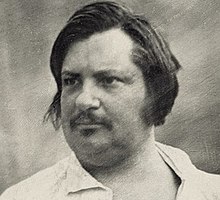Honore de Balzac
| Honoré de Balzac | |
|---|---|
 |
|
| Born | Honoré Balzac 20 May 1799 Tours, Indre-et-Loire, France |
| Died | 18 August 1850 (aged 51) Paris, France |
| Resting place | Père Lachaise Cemetery, Paris |
| Occupation | Writer, critic, journalist, printer |
| Nationality | French |
| Alma mater | University of Paris |
| Genre | Novel, dramaturgy, essay |
| Literary movement | Realism |
| Notable works | |
| Notable awards |
|
| Years active | 1829–1850 |
| Spouse |
Ewelina Hańska (m. 1850) (née Contessa Rzewuska) |
|
|
|
| Signature |  |
Honoré de Balzac (/ˈbɔːlzæk, ˈbæl-/;French: [ɔ.nɔ.ʁe d(ə) bal.zak], born Honoré Balzac, 20 May 1799 – 18 August 1850) was a French novelist and playwright. The novel sequence La Comédie Humaine, which presents a panorama of post-Napoleonic French life, is generally viewed as his magnum opus.
Owing to his keen observation of detail and unfiltered representation of society, Balzac is regarded as one of the founders of realism in European literature. He is renowned for his multi-faceted characters; even his lesser characters are complex, morally ambiguous and fully human. Inanimate objects are imbued with character as well; the city of Paris, a backdrop for much of his writing, takes on many human qualities. His writing influenced many famous writers, including the novelists Émile Zola, Charles Dickens, Gustave Flaubert, Jack Kerouac, Akira Kurosawa and Henry James, as well as important philosophers such as Friedrich Engels. Many of Balzac's works have been made into films, and they continue to inspire other writers.
...
Wikipedia
